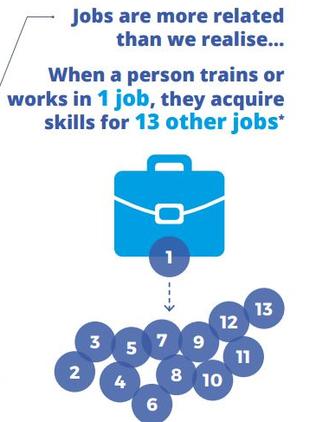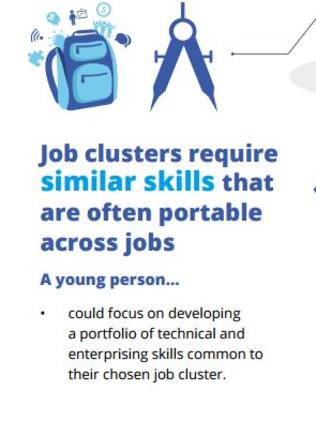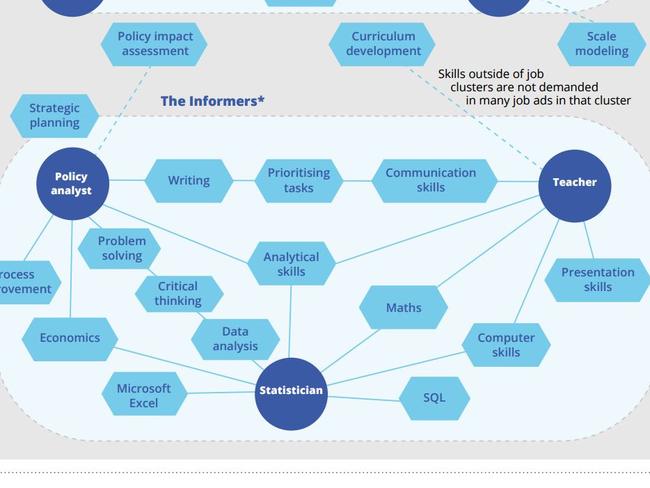Never ask a young person ‘what do you want to be when you grow up?’
WE do it to just about every child we come across, but apparently there’s a good reason you shouldn’t ask children what they want to be when they grow up.
IT’S the question we ask children all the time without even thinking: “What do you want to be when you grow up?”
But according to experts, this often mindless, politely-intended snippet of small talk is something we should all think twice about saying.
Speaking at an education conference in Sydney last week, Foundation for Young Australians chief executive Jan Owen explained why the common question is “probably the worst question you could ever ask a young person today, and probably never, ever should ask again”.
Ms Owen shovels no blame on those of us who question kids in this way. She acknowledged we have “always, forever, asked any child or young person we’ve ever met”, and pointed out we don’t even have to know someone to question a child’s career prospect in such a way.
But, the future of work is changing, she argues, and with it our attitudes to careers need to change. Kids these days don’t necessarily know, and they shouldn’t be pressured to answer that query.
The Foundation for Young Australians has released new research revealing a 15-year-old today is likely to have up to 17 jobs across five different industries over the span of their life.
The New Work Mindset report presented at last week’s EduTech conference also points out seven in 10 jobs will be disrupted and transformed within the next five to 10 years, and 60 per cent of young people studying are preparing for traditional jobs that are unlikely to exist.
The worst part? No one’s telling these students the jobs they’re aiming for are going to be transformed.

“Our research is really clear about this, that the dream job, that one job for life, is actually kind of done, it’s over,” Ms Owen said while presenting the research at a national education conference.
“If you’re not going to have one career and one dream job and one profession, what we need to consider is, how should we think about how work is being organised in Australia?”
In examining 2.7 million job advertisements and speaking with Australian employers across industries, FYA looked at which jobs shared skills and capabilities that employers demanded, and discovered job clusters.
Instead of looking at career paths or job titles for prospective employees to aim towards, the foundation found it made more sense to look “underneath” jobs, and at what bound them together.
“This research told us jobs were more related than we thought if we looked at skills and capabilities, and that’s very important for young people when we remember 70 per cent of jobs are going to be disrupted or transformed in some way,” Ms Owen said.
“What we discovered was that one job could unlock up to 13 others in a cluster, and if you saw a cluster as kind of lily pads that you could move around, if you wanted to get part time work or an internship or an apprenticeship, then you could look across a cluster.”
The seven job clusters are: generators, artisans, carers, informers, co-ordinators, designers and technologists. Carers, informers and technologists held the strongest future prospects.
The research report suggests a young person choose a job cluster based on their interests and strengths rather than focus on one dream job, and gain experience through early career jobs in the job cluster.


“That linear path, and (the concern) if something happens that you’re knocked off the horse, that is being transformed by this idea that if you’re in a cluster you can move and you can transform your experience.”
The report also identified skills that employers identified as being desired across all industries, and that have been left out of traditional education and training models.
“In school education we’re very focused on foundational skills, at university and TAFE we’re very focused on technical skills, and we’ve discovered that there are two other absolutely essential parts of the portfolio of learning and work in the future,” Ms Owen said. “One of those are what we can enterprise skills ... career management is super important as well.”
While many young people were stuck training for jobs that would likely not exist or be drastically changed by the time graduates were ready to enter the work force, Ms Owen said it was particularly encouraging that a majority, 69 per cent of young people, said they would like to have a go at having their own business.

“Probably the most liberating thing is there’s no longer a ladder,” she said.
“When my parents were born you got born, you went to school, you went to more school, you went to work, you crazy climbed a ladder, you got a gold pen, you left, you went home, you threw a caravan on the back of your car, you drove around Australia and then you kind of retired and died.
“When I chat to 15-year-old and say you could do that, or you could see your life more like a jungle gym than a ladder, where you are going to have lots of different experiences ... mostly they say ‘I’m up for the jungle gym’.”
Ms Owen said in her experience working with young people, she has seen a generation that are more inspired and open to change, and more interested in what’s happening around them and who genuinely have the hearts and minds for social problems and complex issues in the world.
And as for the question this research has led her to ban, Ms Owen has come up with an alternative: “Maybe the real question to ask a young person, and even ourselves when we wake up in the morning, is: What is the world that you want to create?”




